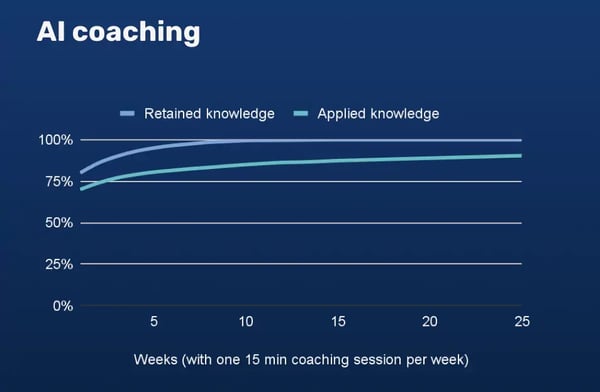Hey, remember that show you watched on TV a few weeks back? Or the big news stories from last week? What about those LinkedIn posts you read this morning? Yeah, I bet you don't remember any of that stuff. Why would you?
Unfortunately, your memory doesn't know the difference between important stuff and useless junk. The "forgetting curve," a well-established phenomenon in the realm of learning and development, reveals a disconcerting truth: without reinforcement, individuals can lose up to 90% of their newly acquired knowledge within a few short weeks.
What's in this post?
The curve of forgetting: 90% of knowledge is lost within weeks
This phenomenon, first discovered by Herrman Ebbinghaus over 140 years ago, poses a significant challenge for individuals seeking to retain and apply their knowledge effectively.
In the context of enterprise training and coaching, the forgetting curve presents a substantial risk to businesses. Traditional coaching methods, while valuable in imparting knowledge and skills, often fall short in ensuring long-term retention and application. It's difficult to transform an organization if your people keep forgetting most of what is presented to them.
|
-90% loss of knowledge |
20% of retained knowledge is |

The challenge of retaining knowledge comes along with the challenge of putting knowledge into practice. According to the Association for Talent Development (ATD), only approximately 10 to 20% of retained knowledge is applied in practice. This means that a substantial portion of the time and resources invested in coaching and training programs is wasted.
Let's break down this statistic further. If we assume that only 10% of the knowledge taught in a conventional training format is retained, and only 10-20% of retained knowledge is put into practice, we can calculate the percentage of new knowledge that is ultimately applied on the job.
10%
knowledge retention rate
x 10-20%
knowledge application rate
= 1-2%
knowledge transfer rate.
This means that a mere 1-2% of the new knowledge covered in a training program is ultimately put into practice. To put it another way, approximately 98-99% of the training curriculum does not result in any significant change or improvement in employee performance. Moreover, it's very hard to predict which 1-2% of knowledge and information provided to learners ultimately ends up being put into practice.
How AI coaching combats the curve of forgetting
Behavioral researchers have figured out methodologies to beat the "forgetting curve." They’ve developed AI-powered coaching methods that build on repetition and reinforcement techniques to keep learners engaged and help them remember what they've learned. Unlike traditional coaching, AI coaching is always on, giving you personalized feedback and guidance that sticks.
Here's how it works: the AI coach keeps testing your knowledge and throwing new stuff at you until you've got it down. Participating in an AI coaching program isn't just about learning more; it also helps you remember what you've learned for longer. After a single coaching session, you'll remember about 75% of the information that was taught. And that's not all! After just 10 coaching sessions, you'll gain and remember an extra 25% of knowledge. So instead of forgetting 90% of what you learn, you'll actually gain 75% after the first session and keep that knowledge while gaining an additional 2-3% with each coaching session.
But AI coaching isn't just about memorizing facts. It's also about helping you apply what you've learned to real-world situations. The AI coach does this by simulating real-world scenarios and giving you personalized feedback. This way, you can practice your skills in a safe environment before you try them out on the job.
The result? AI coaching makes you not only smarter but also more effective. A study by Retorio with 3.301 users suggests that people who use AI coaching are 8 times more effective at applying what they've learned on the job.
|
+25% gain of knowledge |
8x more effective in translating |

The real-world impact of AI coaching
The success of AI coaching in overcoming the forgetting curve is evident in its impact on enterprise clients. A large telecommunication company using AI coaching, for instance, experienced a remarkable 70% reduction in training effort per new hire and a 38% decrease in ramp-up time due to faster knowledge transfer. This translates to significant cost savings and faster onboarding, enabling employees to become productive more quickly.
A large automotive company witnessed a 7% revenue growth in its sales cluster within just four months of implementing AI coaching. This growth was fueled by improved sales performance, with one in five mid-performers reaching top performance levels. Retorio's AI coaching helped the company’s employees retain and apply sales techniques effectively, leading to tangible business results.
A global leader in energy saw its leaders rapidly adapt ideal behaviors, progressing from 60% to 95% target achievement in just eight coaching sessions. This demonstrates the power of AI coaching to accelerate learning and drive behavioral change, even in complex leadership scenarios.
You can find more examples and case studies here.
Interested in experiencing AI coaching? Retorio offers demos/trials, which you can book here:
The forgetting curve shows that learners tend to forget a significant portion of new information shortly after learning it. According to studies, learners may forget up to 40% of newly acquired information within just 20 minutes, with this number increasing to 77% over the next six days 2. This rapid decline in retention poses a significant challenge for training programs aiming to produce lasting results.
The forgetting curve was discovered by German psychologist Hermann Ebbinghaus in 1885. His experiments on memory retention led to the development of this influential concept in cognitive psychology.
Understanding the forgetting curve is crucial for both learners and educators. For students, it explains why cramming for exams often leads to poor long-term retention. For businesses, it shows why one-off training sessions may not be effective in the long run.
Scenario 1: Performance issues
An experienced project manager named Michelle has been consistently working hard and reliably for 3 years. However, recently:
- She has started missing critical details on several projects
- Not tracking due dates and following up on late deliverables
- Two team members have expressed concern about her performance, implying she may be dealing with personal issues
This scenario highlights common performance problems that can arise unexpectedly, requiring immediate attention from management.
Scenario 2: Communication breakdowns
A sales manager named Carl holds a department meeting seeking input from his four sales representatives. However, the employees fail to respond when asked for their opinions. When pressed further, one representative bluntly states:
"Why does it matter what we think? You're going to do what you want anyway. Why are we even here?"
This scenario demonstrates communication breakdowns that can occur between managers and employees, potentially leading to low morale and decreased productivity.
Scenario 3: Role changes and motivation challenges
Susan, a 15-year veteran employee operating engraving machinery, faces a sudden change in her role:
- Her job is being eliminated due to restructuring
- She's offered a position in order picking and packing
- Initially accepts but struggles with the new task
- Shows little motivation to improve
This scenario illustrates the challenges employees face when adapting to new roles or facing job changes, which can affect both individual and team performance.
Scenario 4: Performance review disputes
After delivering an annual review, Mark receives mixed feedback:
- Rated as "average" on meeting goals
- Addressed recent issues including lack of contribution in department meetings and missed deadlines
- He disputes the fairness of the review and refuses to sign it
This scenario highlights potential conflicts that can arise during performance reviews, emphasizing the importance of clear communication and objective assessment.
Scenario 5: Progressive disciplinary actions
Michelle's performance issues persist despite verbal and written warnings:
- Continues making careless mistakes and falling short on responsibilities
- Arriving late 1-2 times per week
- Despite repeated interventions, her performance hasn't improved
- Projects are now at risk due to her subpar work
This scenario demonstrates the progressive disciplinary actions that may be necessary when addressing persistent performance issues 1.
Retorio's AI coaching platform offers personalized development plans tailored to individual employees' needs and skill gaps. This approach ensures that each employee receives relevant training that addresses their specific areas for improvement.
1. Overcoming the forgetting curve:
- Combats the natural tendency to forget information over time
- Helps retain and apply knowledge more effectively
- Significantly increases long-term knowledge retention rates
2. Personalized learning experience:
- Provides personalized feedback and guidance tailored to individual needs
- Adapts to each learner's pace and learning style
3. Improved knowledge application:
- Simulates real-world scenarios to practice skills safely
- Increases the percentage of retained knowledge applied in practice
- Enhances overall effectiveness in translating learned knowledge into job performance
4. Cost-effective training:
- Reduces training effort required per new hire
- Decreases ramp-up time for new employees
- Leads to significant cost savings through efficient knowledge transfer
5. Measurable business impact:
- Demonstrates tangible improvements in employee performance
- Can lead to increased revenue growth (e.g., 7% increase in sales revenue observed in one automotive company)
- Accelerates progress towards organizational goals
6. Scalability:
- Can be implemented across large organizations with ease
- Suitable for various industries and types of employees (from sales representatives to leaders)
7. Data-driven insights:
- Provides actionable insights for continuous improvement of training programs
- Helps identify areas where additional focus is needed
By leveraging Retorio's AI coaching, large companies can significantly enhance their training programs, improve employee performance, and achieve better long-term outcomes from their investments.




